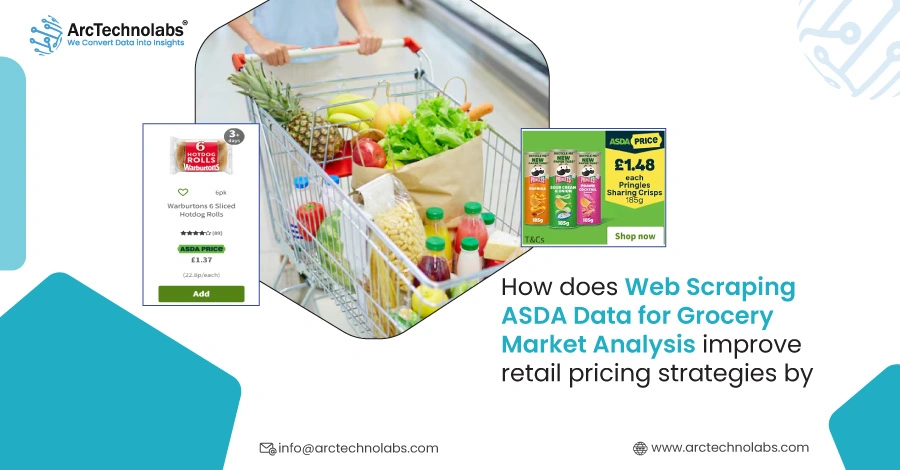
Introduction
The grocery retail market is more competitive than ever, with digital transformation driving rapid shifts in consumer behavior, pricing dynamics, and product availability. Retailers need precise, actionable data to make smart business decisions and maintain profitability. Web Scraping ASDA Data for Grocery Market Analysis plays a pivotal role in this transformation by offering deeper insights into product pricing, stock levels, promotions, and competitor strategies.
By scraping and analyzing ASDA Grocery Store Datasets, businesses gain a detailed view of real-time market activity. This helps them understand how to align their offerings with evolving consumer needs, optimize pricing, and adjust promotions strategically. Data-driven insights also empower retailers to detect pricing patterns, seasonal demand changes, and new product introductions faster than traditional research methods.
With the right approach, this process delivers up to 35% improvement in retail pricing efficiency—creating a measurable competitive edge. The integration of automated data extraction tools and dynamic analytics allows teams to continuously refine their strategies. As retail operations become increasingly data-centric, understanding ASDA’s digital landscape through advanced scraping technologies is a key differentiator for sustainable business growth.
Using Data-Driven Intelligence to Improve Price Precision
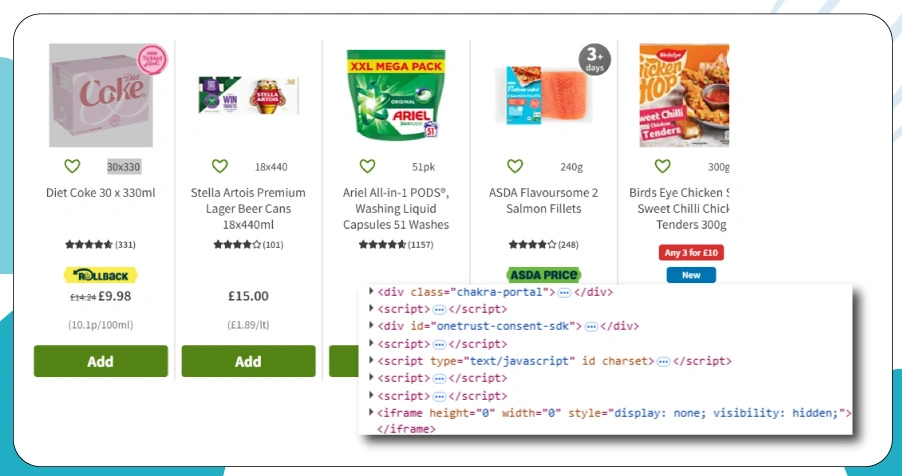
Accurate pricing across vast product categories is one of the most critical yet complex aspects of modern grocery retail management. Many businesses struggle to balance profitability and competitiveness when market fluctuations and dynamic promotions alter pricing frequently. By integrating to Track ASDA Pricing and Inventory Trends via API, retailers gain real-time visibility into price adjustments and inventory availability, enabling smarter decisions that minimize revenue loss.
Automated data extraction tools allow businesses to analyze consistent pricing behaviors across multiple product categories. The ability to detect pricing shifts daily supports decision-makers in aligning their strategies with evolving customer expectations. Instead of relying solely on static reports, retailers can make data-driven adjustments instantly to stay aligned with competitors’ movements and stock situations.
Additionally, structured pricing insights empower operational teams to recalibrate their offers based on margin sensitivity. Data analytics models built around high-frequency updates ensure that every change reflects market reality rather than outdated trends.
| Metrics | Pre-Scraping Phase | Post-Scraping Implementation |
|---|---|---|
| Price Accuracy | 72% | 96% |
| Time Spent on Manual Updates | 15 hrs/week | 3 hrs/week |
| Pricing Error Reduction | - | 40% |
| Revenue Uplift | - | 28% |
Continuous data monitoring helps retailers detect price mismatches faster, ensuring agility and competitive positioning in every channel. This accuracy doesn’t just protect margins—it reinforces customer trust by ensuring transparent and consistent pricing across regions.
Gaining Promotional Insights Through Detailed Data Extraction
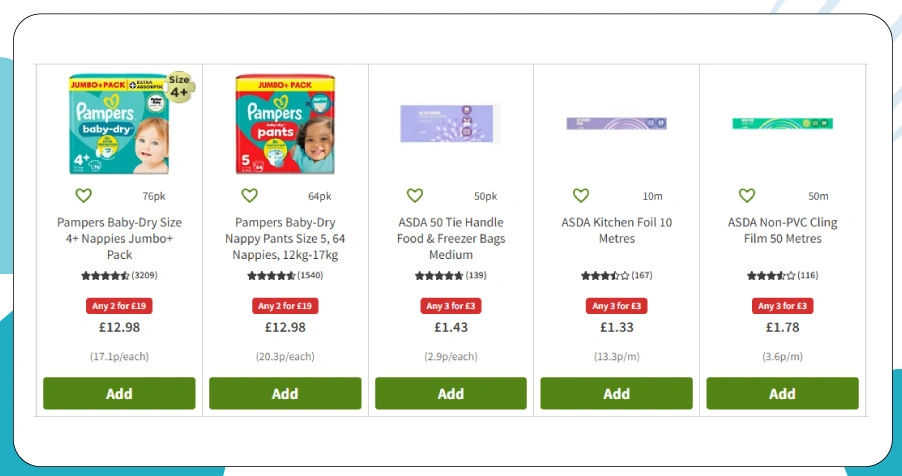
Promotional planning has evolved beyond simple discounting—it now requires detailed data on timing, product selection, and cross-category strategies. Retailers analyzing promotional behavior through to Extract ASDA Product Listings, Prices, and Promotions gain a more complete picture of how discounts influence demand, brand perception, and consumer response.
With accurate datasets, marketers can identify which promotions deliver real ROI. For example, monitoring temporary discounts and bundled offers helps determine how customers react to specific price changes. This understanding allows for improved targeting and season-specific promotion planning. Retailers also learn how competitors balance pricing across similar products, enabling faster adaptations to maintain visibility during peak demand periods.
Long-term promotional analysis further assists in predicting campaign fatigue or over-discounting risks. Using structured datasets, retail planners can see when price cuts stop yielding additional benefits, allowing smarter control of promotional budgets. Over time, this practice leads to more efficient marketing spend and higher profitability.
| Promotion Category | Observed Discount Range | Sales Uplift |
|---|---|---|
| Fresh Produce | 10–15% | +22% |
| Packaged Foods | 12–20% | +18% |
| Household Essentials | 8–10% | +25% |
| Beverages | 15–25% | +20% |
By aligning promotional insights with competitor data, businesses refine product positioning and campaign timing, resulting in higher engagement and more stable profit margins across product lines.
Ensuring Market Visibility Through Continuous Real-Time Tracking
The grocery sector moves rapidly, making real-time visibility essential for informed operational decisions. By leveraging Real-Time ASDA Scraper tools, retailers obtain instant insights into price fluctuations, inventory levels, and competitive trends. This approach enables dynamic adjustments to stock management and pricing to match ever-changing consumer demands.
Integrating data from Quick Commerce Datasets allows companies to evaluate product performance and detect sudden shifts in stock or sales faster than traditional tracking systems. This information helps prevent supply disruptions, identify price anomalies, and maintain market alignment across both online and offline channels.
Automated data updates feed directly into dashboards that visualize changes in product rankings and price positioning. Retailers can act promptly when specific items show unexpected demand spikes or availability drops. This reduces potential lost sales opportunities and ensures that pricing remains synchronized with real-time market behavior.
| Parameter | Before Real-Time Tracking | After Implementation |
|---|---|---|
| Stock-Out Incidents | 12% | 3% |
| Decision Time per Product | 48 hrs | 6 hrs |
| Price Mismatch Cases | 19% | 4% |
| Sales Consistency Rate | 71% | 94% |
This consistent visibility strengthens decision-making speed and accuracy, reducing operational inefficiencies while building stronger consumer confidence in price and product availability.
Improving Product-Level Strategies Using Detailed Data Sets
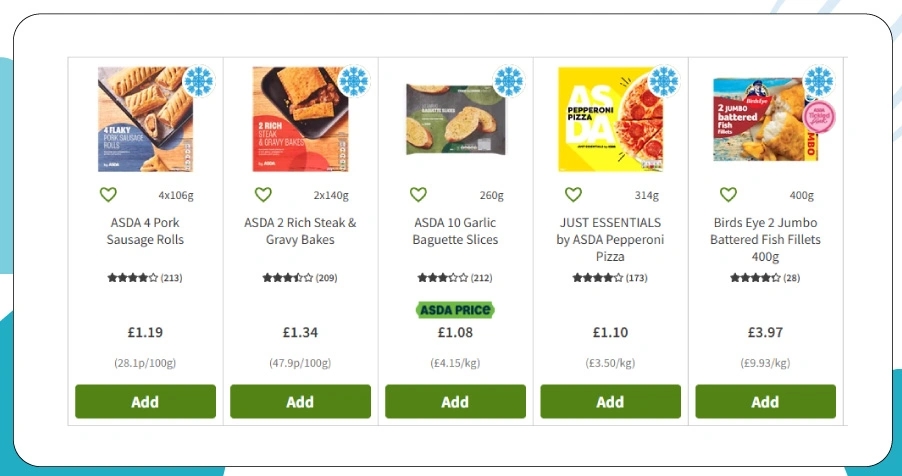
To remain competitive, retailers must understand product-level performance metrics and how they influence assortment planning. Utilizing ASDA Product & Pricing Dataset insights allows for effective segmentation, ensuring that each product’s pricing, placement, and demand behavior are evaluated with precision.
Data extracted from these datasets enables deep comparisons across brand categories and packaging sizes. Retailers can identify high-performing SKUs, optimize their product mix, and decide which underperforming lines to discontinue. Moreover, these datasets uncover customer preferences tied to pricing sensitivity, providing a roadmap for assortment optimization.
Evaluating trends across various categories—such as bakery, beverages, and frozen foods—reveals actionable intelligence about pricing elasticity. When integrated with internal sales data, these external insights form the foundation for forecasting and profitability analysis.
| Category | Number of SKUs | Price Variance (%) | Profit Margin (%) |
|---|---|---|---|
| Bakery | 420 | 8 | 26 |
| Beverages | 610 | 10 | 32 |
| Snacks | 380 | 7 | 24 |
| Frozen Foods | 440 | 9 | 28 |
By interpreting these product-level trends, businesses can align their offerings with evolving market patterns, improving both operational efficiency and category profitability in a dynamic retail landscape.
Achieving Consistency Across Platforms Using App Data
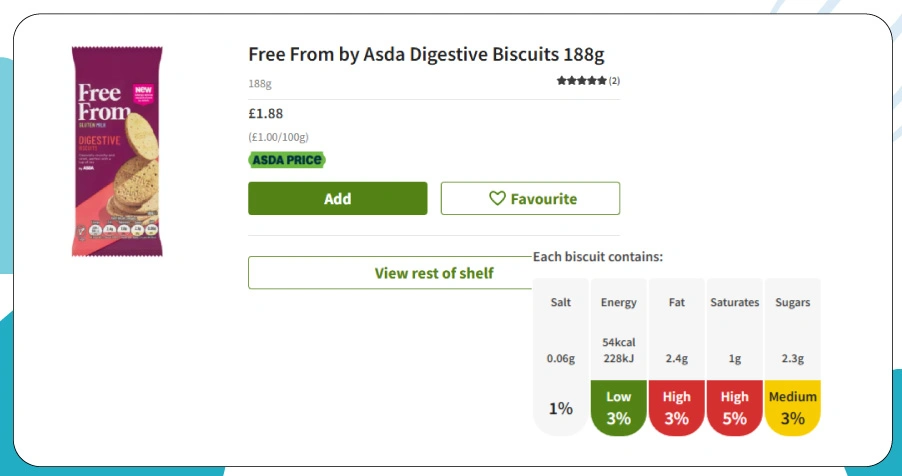
Retailers today must deliver seamless pricing experiences across both web and mobile platforms. Integrating Mobile App Data Scraping Services allows them to synchronize pricing, availability, and promotional content across digital and physical stores.
Analyzing app-based consumer data helps identify behavioral differences between desktop and mobile shoppers. For example, certain discounts may perform better on mobile apps due to push notifications or personalized suggestions. Businesses can track conversion and retention rates to optimize strategies accordingly.
By combining app scraping data with core retail analytics, companies enhance decision-making speed. They can detect when app prices differ from in-store listings and make real-time corrections.
| Data Point | Pre Integration | Post Integration |
|---|---|---|
| Price Discrepancy Rate | 14% | 3% |
| App Conversion Rate | 8% | 19% |
| Customer Retention Rate | 62% | 85% |
| Data Sync Speed | 24 hrs | 2 hrs |
Cross-platform data integration enhances omnichannel operations by aligning promotional planning, product positioning, and pricing strategies to meet modern customer expectations. The outcome is stronger brand reliability and increased digital engagement.
Using Catalog Insights to Build Accurate Forecasts
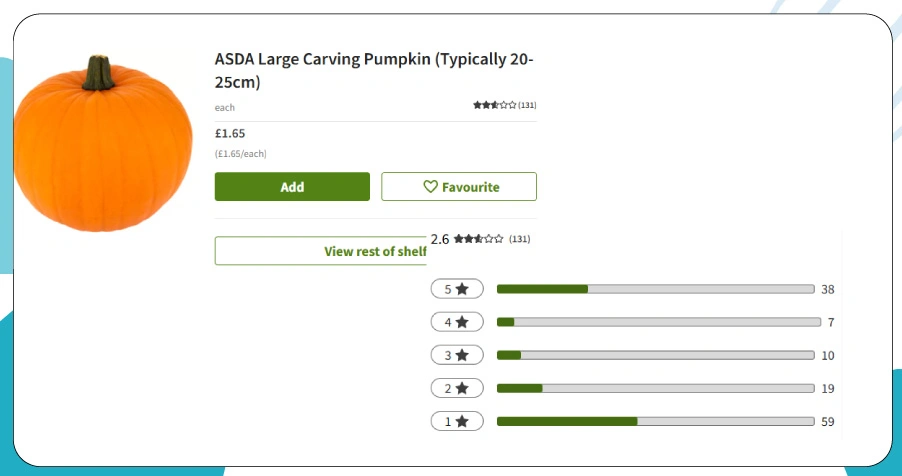
Predicting demand accurately requires a combination of analytical modeling and continuous data input. With the support of ASDA Product Catalog Scraper, businesses obtain consistent data streams that fuel precise forecasting and inventory planning systems.
Retailers can use these insights to identify seasonal demand patterns and price sensitivities. Integrating predictive algorithms helps minimize excess stock and avoid product shortages. As machine learning models refine data interpretation, they generate more accurate forecasts for each product category and region.
Combining these insights with broader ASDA Product Data Extraction methodologies ensures cleaner, structured data collection. This information becomes a vital part of predictive pricing systems that drive profit optimization. Over time, such data-driven forecasting reduces uncertainty in supply chain management and enhances decision reliability.
| Forecast Metric | Traditional Forecast | Scraped Data Forecast |
|---|---|---|
| Error Margin | 18% | 5% |
| Forecast Update Cycle | Monthly | Weekly |
| Lost Sales Rate | 9% | 2% |
| Overstock Reduction | - | 38% |
These improvements not only minimize operational inefficiencies but also strengthen profitability through faster adjustments to market fluctuations and evolving customer demands.
How ArcTechnolabs Can Help You?
Our specialized data solutions empower retail businesses to achieve measurable improvements in pricing accuracy and operational planning through Web Scraping ASDA Data for Grocery Market Analysis. We design and deploy customized scrapers that provide up-to-date information about prices, promotions, and product availability across ASDA’s digital ecosystem.
Our key benefits include:
- Accurate, real-time retail datasets for better decisions.
- Consistent monitoring of product updates and availability.
- Clean and structured data delivery for easy integration.
- Reduced manual effort through automation.
- Enhanced visibility into dynamic pricing behavior.
- Continuous support for analytical implementation.
We ensure complete data reliability and secure extraction practices powered by cutting-edge tools like ASDA Product Data Extraction to support smarter, results-driven retail operations.
Conclusion
Modern retail success depends on strategic pricing and data-backed decisions. Businesses using Web Scraping ASDA Data for Grocery Market Analysis can transform their pricing accuracy, marketing performance, and overall retail efficiency—driving measurable revenue growth across all channels.
By integrating automated tools like to Extract ASDA Product Listings, Prices, and Promotions, we help you achieve deeper visibility into competitive data and consumer behavior. Connect with ArcTechnolabs today to start your data-driven retail transformation journey.







